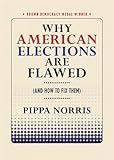Why American Elections Are Flawed (And How to Fix Them) / Pippa Norris.
Material type: TextSeries: Brown Democracy MedalPublisher: Ithaca, NY : Cornell University Press, [2017]Copyright date: ©2017Description: 1 online resource (68 p.) : 2 b&w line drawings, 6 color line drawings, 1 mapContent type:
TextSeries: Brown Democracy MedalPublisher: Ithaca, NY : Cornell University Press, [2017]Copyright date: ©2017Description: 1 online resource (68 p.) : 2 b&w line drawings, 6 color line drawings, 1 mapContent type: - 9781501712753
- Legal History & Studies
- Political Science & Political History
- U.S. History
- POLITICAL SCIENCE / Political Process / Campaigns & Elections
- elections, American electoral process, electoral managemen, electoral integrity, Electoral Integrity Project, party polarization, public awareness, public trust, campaigning
- 320
- online - DeGruyter
| Item type | Current library | Call number | URL | Status | Notes | Barcode | |
|---|---|---|---|---|---|---|---|
 eBook
eBook
|
Biblioteca "Angelicum" Pont. Univ. S.Tommaso d'Aquino Nuvola online | online - DeGruyter (Browse shelf(Opens below)) | Online access | Not for loan (Accesso limitato) | Accesso per gli utenti autorizzati / Access for authorized users | (dgr)9781501712753 |
Frontmatter -- Contents -- Introduction -- I: Challenges of Electoral Integrity during the 2016 US Elections -- II: Measuring Electoral Integrity -- III: Comparing Electoral Integrity within and across States -- IV: What Is to Be Done? -- V: Conclusions and Recommendations -- Acknowledgments -- Notes -- About the Author
restricted access online access with authorization star
http://purl.org/coar/access_right/c_16ec
The flaws in the American electoral process have become increasingly apparent in recent years. The contemporary tipping point in public awareness occurred during the 2000 election count, and concern deepened due to several major problems observed in the 2016 campaign, worsening party polarization, and corroding public trust in the legitimacy of the outcome.To gather evidence about the quality of elections around the world, in 2012 the Electoral Integrity Project (EIP) was established as an independent research project based at Harvard and Sydney universities. The results show that experts rated American elections as the worst among all Western democracies. Without reform, these problems risk damaging the legitimacy of American elections—further weakening public confidence in political parties, Congress, and the U.S. government, depressing voter turnout, and exacerbating the risks of mass protests.Why American Elections Are Flawed describes several major challenges observed during the 2016 U.S. elections arising from deepening party polarization over basic voting procedures, the serious risks of hacking and weak cyber-security, the consequences of deregulating campaign spending, and lack of professional and impartial electoral management. Pippa Norris outlines the core concept and measure of electoral integrity, the key yardstick used to evaluate free and fair elections. Evidence from expert and mass surveys demonstrate the extent of problems in American elections. She shows how these challenges could be addressed through several practical steps designed to improve electoral procedures and practices. If implemented, the reforms will advance free and fair elections, and liberal democracy, at home and abroad.
Mode of access: Internet via World Wide Web.
In English.
Description based on online resource; title from PDF title page (publisher's Web site, viewed 26. Apr 2024)


